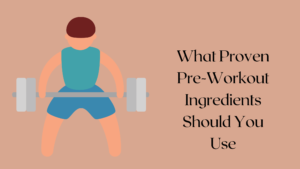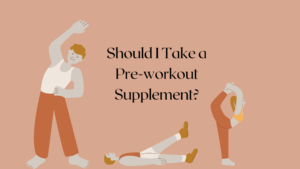
Pre-workout is a type of dietary supplement designed to enhance athletic performance, increase energy levels, and improve focus and endurance during exercise. Pre-workout supplements typically come in powdered or capsule form and are consumed before exercise to provide a quick boost of energy and nutrients.
Pre-workout supplements typically contain a blend of ingredients such as caffeine, amino acids, creatine, and nitric oxide boosters that work together to increase energy, focus, and endurance. The ingredients in pre-workout supplements are designed to help you push harder and longer during your workouts, allowing you to get the most out of your exercise routine.
While pre-workout supplements can be effective in boosting athletic performance, it is important to use them safely and as directed. Some pre-workout supplements can have potentially harmful side effects and should be used with caution. Additionally, pre-workout supplements are not a substitute for a healthy diet and regular exercise routine.
What Are the Most Popular Pre-Workout Ingredients?
There are several common ingredients found in pre-workout supplements that are known for their ability to enhance athletic performance. Here are some of the most popular pre-workout ingredients:
- Caffeine – Caffeine is a stimulant that can increase energy levels, improve focus, and reduce fatigue. It is one of the most commonly used pre-workout ingredients and can be found in many pre-workout supplements.
- Beta-Alanine – Beta-alanine is an amino acid that helps to reduce fatigue and improve endurance by increasing the levels of carnosine in the muscles.
- Creatine – Creatine is a naturally occurring substance in the body that helps to produce energy during high-intensity exercise. It is commonly used in pre-workout supplements to enhance strength and power.
- Nitric Oxide Boosters – Nitric oxide boosters such as L-arginine and citrulline are often used in pre-workout supplements to increase blood flow and improve muscle pump.
- B Vitamins – B vitamins such as B6 and B12 are often added to pre-workout supplements to help convert food into energy and improve mental focus.
What Proven Pre-Workout Ingredients Should You Use?

While there are many ingredients commonly found in pre-workout supplements, some have been proven to be more effective than others. Here are some pre-workout ingredients that have been shown to be effective in enhancing athletic performance:
- Caffeine – Caffeine is a proven pre-workout ingredient that has been shown to increase energy levels, improve focus, and reduce fatigue. Research has also shown that caffeine can enhance athletic performance and endurance.
- Beta-Alanine – Beta-alanine has been shown to improve endurance and delay the onset of fatigue during high-intensity exercise. It works by increasing the levels of carnosine in the muscles, which helps to buffer lactic acid and reduce muscle fatigue.
- Creatine – Creatine is one of the most well-researched pre-workout ingredients and has been shown to improve strength, power, and muscle endurance. It works by increasing the levels of phosphocreatine in the muscles, which helps to produce energy during high-intensity exercise.
- Citrulline – Citrulline is an amino acid that has been shown to increase nitric oxide production and improve blood flow. This can help to enhance muscle pump, reduce fatigue, and improve endurance.
- B Vitamins – B vitamins such as B6 and B12 have been shown to play a role in energy production and metabolism. They can help to convert food into energy and improve mental focus during exercise.
Pre-Workout Ingredients to Avoid
While there are many effective pre-workout ingredients, some ingredients should be avoided or used with caution due to potential side effects or lack of evidence for their effectiveness. Here are some pre-workout ingredients to be cautious of:
- DMAA (1,3-dimethylamylamine) – DMAA is a stimulant that has been banned in many countries due to its potential health risks, including increased blood pressure, heart rate, and risk of heart attack and stroke.
- Ephedrine – Ephedrine is a stimulant that has been linked to serious health risks, including heart attack, stroke, and death. It has been banned in many countries and should not be used in pre-workout supplements.
- Yohimbine – Yohimbine is a stimulant that is often used in pre-workout supplements as a fat burner. However, it has been linked to side effects such as anxiety, high blood pressure, and rapid heart rate.
- Synephrine – Synephrine is a stimulant that is often used in pre-workout supplements as a fat burner. However, it has been linked to side effects such as high blood pressure, rapid heart rate, and increased risk of heart attack and stroke.
- Proprietary Blends – Proprietary blends are mixtures of ingredients that are not listed individually on the supplement label. This makes it difficult to determine the dosage of each ingredient and can increase the risk of side effects.
Types of Pre-Workout Supplement Formulas
There are several different types of pre-workout supplement formulas, each designed to target specific aspects of athletic performance. Here are some common types of pre-workout supplements:
- Stimulant-Based Pre-Workouts – Stimulant-based pre-workouts are designed to increase energy levels, focus, and endurance through the use of stimulants such as caffeine, beta-alanine, and taurine.
- Pump-Based Pre-Workouts – Pump-based pre-workouts are designed to increase blood flow and enhance muscle pump through the use of nitric oxide boosters such as L-arginine and citrulline.
- Creatine-Based Pre-Workouts – Creatine-based pre-workouts are designed to enhance strength, power, and endurance through the use of creatine monohydrate.
- Non-Stimulant Pre-Workouts – Non-stimulant pre-workouts are designed to enhance athletic performance without the use of stimulants. They may include ingredients such as amino acids, vitamins, and minerals.
Are Pre-Workout Supplements Actually Effective?
While pre-workout supplements can be effective in enhancing athletic performance, their effectiveness may vary depending on the individual and the specific supplement used. Some studies have shown that certain ingredients commonly found in pre-workout supplements, such as caffeine and creatine, can enhance athletic performance and improve endurance.
However, it is important to note that the quality and dosage of ingredients can vary widely between different pre-workout supplements. Additionally, some ingredients may have potential side effects and should be used with caution.
It is also important to remember that pre-workout supplements are not a substitute for a healthy diet and regular exercise routine. While pre-workout supplements can provide a quick boost of energy and nutrients, they should be used in conjunction with a balanced diet and consistent exercise routine for best results.
Pre-Workout Supplement Side Effects and Risks
Pre-workout supplements can have potential side effects and risks, especially when used in excessive doses or with certain underlying health conditions. Here are some potential side effects and risks of pre-workout supplements:
- Dehydration – Pre-workout supplements may increase fluid loss through sweat, which can lead to dehydration if not properly hydrated.
- Increased Heart Rate and Blood Pressure – Many pre-workout supplements contain stimulants such as caffeine and can cause an increase in heart rate and blood pressure. This can be dangerous for individuals with pre-existing heart conditions.
- Insomnia and Sleep Disturbances – Pre-workout supplements containing stimulants can cause insomnia and sleep disturbances if taken too close to bedtime.
- Digestive Issues – Some pre-workout supplements may cause digestive issues such as nausea, diarrhea, and stomach cramps.
- Allergic Reactions – Pre-workout supplements may contain ingredients that can cause allergic reactions in some individuals, such as soy, dairy, and gluten.
- Kidney Damage – Certain pre-workout supplements containing high doses of creatine may increase the risk of kidney damage, especially in individuals with pre-existing kidney issues.
- Addiction – The use of pre-workout supplements containing stimulants can lead to addiction and dependence.
It is important to read the labels and instructions carefully and consult with a healthcare professional before taking any pre-workout supplements, especially if you have any underlying health conditions.
Should I Take a Pre-workout Supplement?

Whether or not to take a pre-workout supplement is a personal decision that should be based on individual goals, preferences, and health status. While pre-workout supplements can provide a quick boost of energy and nutrients, they are not a substitute for a healthy diet and regular exercise routine.
It is important to choose a pre-workout supplement that is safe, effective, and tailored to individual needs. This may involve consulting with a healthcare professional or registered dietitian to determine which supplements are right for you and how to use them safely and effectively.
Additionally, it is important to remember that pre-workout supplements are not suitable for everyone. Individuals with pre-existing health conditions, such as heart disease or high blood pressure, should exercise caution and consult with a healthcare professional before using pre-workout supplements.
What Does it Feel Like to Take a Pre-Workout Supplement?
The experience of taking a pre-workout supplement can vary depending on the individual and the specific supplement used. Some common effects of pre-workout supplements may include:
- Increased Energy – Pre-workout supplements containing caffeine and other stimulants can provide a quick boost of energy, making it easier to power through a workout.
- Enhanced Focus – Some pre-workout supplements may contain ingredients that enhance focus and mental clarity, making it easier to stay on track and maintain a consistent workout routine.
- Improved Endurance – Pre-workout supplements containing ingredients such as creatine and beta-alanine may improve endurance and delay fatigue during exercise.
- Muscle Pump – Some pre-workout supplements containing nitric oxide boosters may enhance muscle pump and increase blood flow to the muscles.
- Tingling Sensation – Pre-workout supplements containing beta-alanine may cause a tingling sensation in the skin, which is harmless but may be uncomfortable for some individuals.
It is important to note that not all individuals may experience these effects, and the intensity and duration of effects may vary depending on the individual and the specific supplement used.
Final Words
Pre-workout supplements can be a useful tool for enhancing athletic performance and improving workout outcomes. However, it is important to choose supplements that are safe, effective, and tailored to individual needs. Pre-workout supplements should be used in conjunction with a healthy diet and regular exercise routine for best results.
It is also important to exercise caution when using pre-workout supplements, as they can have potential side effects and risks, especially when used in excessive doses or with underlying health conditions. Consulting with a healthcare professional or registered dietitian can help individuals determine which supplements are right for them and how to use them safely and effectively.
Ultimately, the decision to use pre-workout supplements is a personal one that should be based on individual goals, preferences, and health status. It is important to consider the potential benefits and risks before making a decision, and to always follow the instructions and recommended dosages provided by the supplement manufacturer.
In conclusion, pre-workout supplements can be a valuable addition to a healthy lifestyle and exercise routine. By providing a quick boost of energy, nutrients, and other performance-enhancing ingredients, pre-workout supplements can help individuals maximize their workouts and achieve their fitness goals.
However, it is important to exercise caution and choose supplements that are safe, effective, and tailored to individual needs. By doing so, individuals can reap the benefits of pre-workout supplements without experiencing unwanted side effects or risking their health.